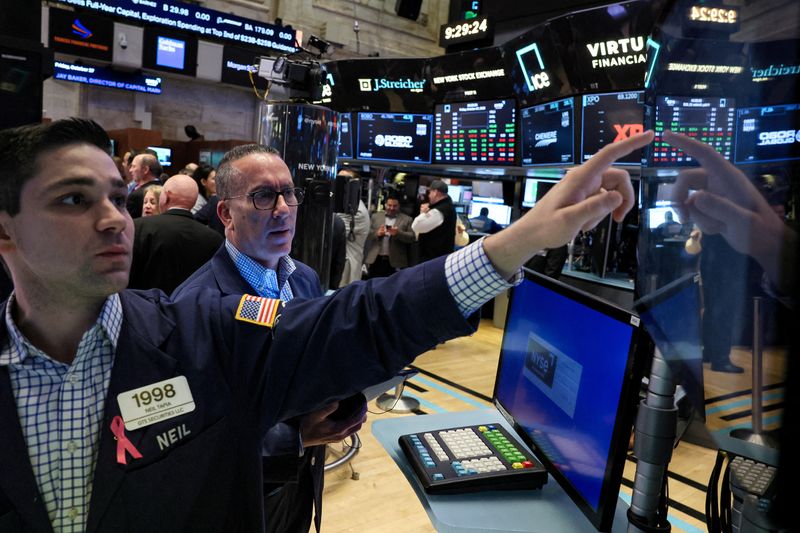By Stephen Culp
NEW YORK (Reuters) -U.S. stocks edged lower on Monday, with investors taking a post-Thanksgiving pause as the holiday shopping season kicked in to high gear and retailers lured bargain hunters with Cyber Monday deals.
All three major U.S. stock indexes ended the session modestly in the red.
"Markets are taking a breather to digest these gains we’ve seen in November," said Tom Hainlin, national investment strategist at U.S. Bank Wealth Management in Minneapolis. "We’re at the higher end of a trading range we’ve been in for some time."
Online shopping deals as part of Cyber Monday are expected to entice shoppers to spend a record $12 billion, according to Adobe (NASDAQ:ADBE) Analytics, in the latest upbeat sign regarding the health of the American consumer, whose spending is responsible for about 70% of the U.S. GDP.
"Coming off four weeks of very strong and positive market activity we’re seeing investors take a bit of a breather and focus on data," said Greg Bassuk, chief executive officer at AXS Investments in New York. "This week all eyes will be focused on additional inflation data as well as consumer confidence and spending to determine if Main Street has kept up with Wall Street."
Resilience of the consumer and the tightness of the labor market amid signs of a dampening economy have many market-observers digesting the possibility that while the Federal Reserve has reached the end of its tightening cycle, it might keep restrictive policy rates in place for longer than expected.
Financial markets have priced in a 96.8% likelihood that the central bank will leave its Fed funds target rate unchanged at next month's meeting, with the possibility of a rate cut starting to gain ground in mid-2024, according to CME's FedWatch tool.
On the economic front, a larger than expected drop in new home sales added to the subdued tone. Later in the week, market participants look to the Commerce Department's second take on third-quarter GDP expected on Wednesday, to be followed on Friday with its broad-ranging Personal Consumption Expenditures (PCE) report.
Remarks from Federal Reserve policymakers later in the week will also be parsed for clues regarding the duration of the central bank's restrictive policy.
"We expect that (the Fed) will continue to be cautious about concluding that they’ve reached the end of rate hikes," Hainlin added. "We’re close to - if not at - the peak rate, so the debate is how long rates will stay there, and when or if they’ll cut rates in 2024."
The Dow Jones Industrial Average fell 56.68 points, or 0.16%, to 35,333.47, the S&P 500 lost 8.91 points, or 0.20%, to 4,550.43 and the Nasdaq Composite dropped 9.83 points, or 0.07%, to 14,241.02.
Among the 11 major sectors in the S&P 500, healthcare and industrials suffered the largest percentage drops, while real estate and consumer discretionary gained the most.
Amid the Cyber Monday fervor, Affirm Holdings (NASDAQ:AFRM) surged 12.0%, as the payment platform's "buy now, pay later" option was seen hitting an all-time high, boosting the online holiday sales.
Online gift platforms Etsy (NASDAQ:ETSY) and Shopify (NYSE:SHOP) were up 3.0% and 4.9%, respectively.
Elsewhere, Crown Castle International (NYSE:CCI) advanced 3.4% as activist investor Elliott Investment Management sought executive and board changes at the wireless tower owner.
GE HealthCare (NASDAQ:GEHC) declined 3.5% following UBS's downgrade of the medical devices company's stock to "sell" from "neutral."
Declining issues outnumbered advancing ones on the NYSE by a 1.25-to-1 ratio; on Nasdaq, a 1.63-to-1 ratio favored decliners.

The S&P 500 posted 38 new 52-week highs and no new lows; the Nasdaq Composite recorded 84 new highs and 79 new lows.
Volume on U.S. exchanges was 9.25 billion shares, compared with the 10.42 billion average for the full session over the last 20 trading days.